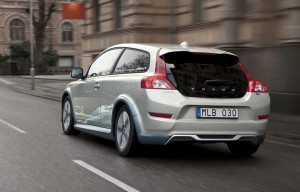
The cost of the batteries in this prototype Volvo C30 would have to plunge from $20,000 to barely $5,000 to make the battery-electric vehicle competitive, warns a new study.
Without a battery breakthrough, electric vehicles are likely to remain little more than a niche segment in the global automotive market, according to a new study that also sees little likelihood this can happen during the coming decade.
Battery costs are coming down, according to a study by the Boston Consulting Group, but not nearly fast enough to make electric vehicles and plug-ins competitive with the time-tested internal combustion engine, or ICE, the report found.
“We need to have breakthroughs in fundamental battery chemistry,” declared Xavier Mosquet, leader of Boston Consulting’s automotive practice, during an appearance at the Automotive Press Association, on Thursday.
That’s not to say batteries aren’t improving. They’re getting smaller, lighter and more powerful. And BCG’s study predicts that the cost of a typical lithium-ion battery will drop from more than $1,000 a kilowatt-hour today to somewhere around $400 by 2020. But Mosquet stressed that to be competitive, prices need to fall even further, to “somewhere in the $200 to $250 range” per kWh.
To put that into comparison, the 24 kilowatt-hour batteries in the prototype Volvo C30 battery-electric vehicle, or BEV, would come to $24,000 today, and would likely drop to a bit under $10,000 by 2020, if Boston Consulting’s forecast proves accurate. But to be competitive without hefty federal tax incentives – currently pegged at $7,500 a vehicle – the cost of the C30’s battery pack would have to drop to barely $5,000.
There are opportunities to improve lithium chemistry, added Boston Consulting’s Massimo Russo, who noted that researchers are working on a variety of different lithium “families,” each with distinctly different characteristics. Some can store more energy per pound, others hold less energy but are more likely to last the 10 years that automakers demand.
Of course, there is the possibility that a completely new form of chemistry could come along, said Russo, with the most promising being the zinc-air battery. But at the moment, it doesn’t seem nearly ready for use in the demanding automotive environment.
Barring a battery breakthrough, governments here and abroad will likely have to spend billions in incentives to support the switch from the IC engine to battery power, the Boston Consulting analysts stressed. Their research shows that motorists won’t make the switch from gasoline to electric power unless it achieves “payback” in less than three years. In other words, the higher cost of a battery-based vehicle would have to be offset by savings on energy.
By 2020, said Mosquet, the figures would likely translate into a modest 6% share of the global automotive market for both battery-electric and plug-in hybrid vehicles combined, or about 3 million vehicles worldwide.
Beyond the cost of incentives, the switch to electric power won’t be cheap, Mosquet added. The consulting firm’s data suggest a bill of at least $20 billion globally to set up the necessary infrastructure, much of that for charging stations. For the U.S. alone that would come to about $8 billion.
